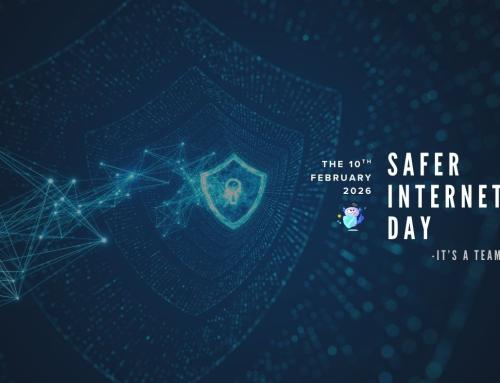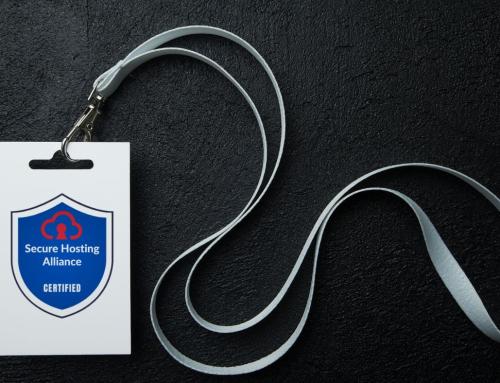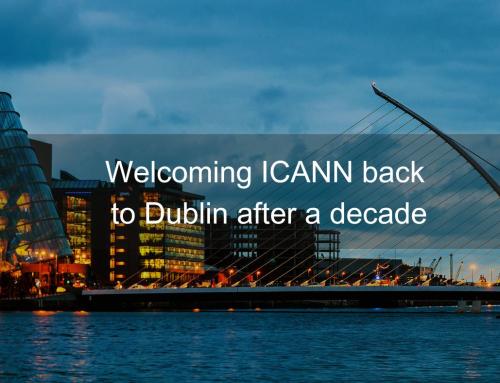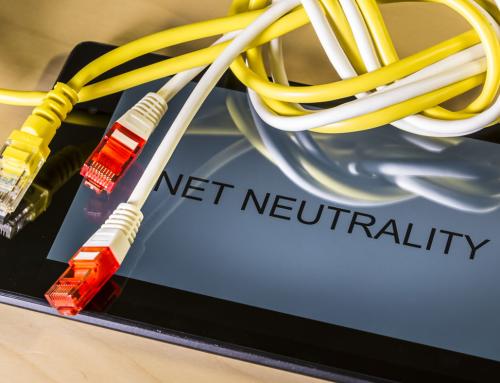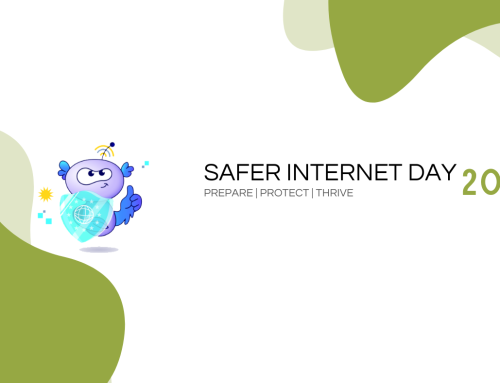For the first time in several years, I got to go to a business conference. In-person! What a novelty!
The occasion was the i2Coalition 10th Anniversary Washington DC fly-in. There’s a lot of background to get through here. First, what is the i2Coalition? Why were they in Washington DC? And why was an Irish company at the table? I have answers to all of those points!
The i2Coalition, also known by its longer name, the Internet Infrastructure Coalition, was founded… 10 years ago in response to the fight against SOPA and PIPA (the copyright and privacy bills that were eventually defeated). It’s important to think of the internet as being made up of three tiers:
- The telecoms companies (like Vodaphone or Virgin)
- The content companies (like Facebook)
- The data centres/domain registrars/infrastructure companies that tie it all together (like Blacknight).
During the SOPA and PIPA fights, there was no trade organisation and lobbying organisation for the last category – of which companies like Blacknight would classify themselves. They didn’t have a united voice in policy or in internet governance. So, the i2Coalition was founded by Christian Dawson, lawyer David Snead, and few other key Internet figures to be that voice. And it has done that for the last ten years, successfully, I might add. Blacknight has been a member since 2013 and our CEO Michele Neylon served as the Chair of the Board of Directors. Currently, I participate in the Domain Working Group, and I’m now joining the DNS Working Group. We meet regularly and discuss the various issues facing infrastructure providers and how we can face them together.
I joined the Domain Working group over two years ago, right when the COVID-19 pandemic hit, so I’ve only known my colleagues at the i2Coalition through our regular Zoom meetings. It was going to be a treat to meet them all in person!
At the end of the day, the i2Coalition is a trade organisation whose goal is to make sure actual policymakers understand the issues facing the internet, consumer privacy, etc., when they’re writing laws. It gives infrastructure providers a seat at the table when a lot of the attention is on the big ISPs or the social media companies. They’ve held annual ‘fly-ins’ in Washington DC to learn about lobbying and meet with US lawmakers and the staffers actually writing the laws. Obviously, they haven’t had the fly-in for the last few years because of the pandemic, so this year was going to be a return to form and a special celebration of 10 years of the organisation’s work.
Now, it’s pretty obvious that Blacknight is an Irish company, so on the surface, it wouldn’t have to care about what US lawmakers do with the internet. The problem with that logic is that the internet is global, and no one country can change it unilaterally. So, it’s important for companies like Blacknight to be at the table even though we’re not the natural constituency for US lawmakers. We still have to work with US companies, regulators, and law enforcement on a regular basis. So, that’s why I went; while I’m an American, I was there representing Irish interests (I wasn’t the only one).
Day 1 Sessions
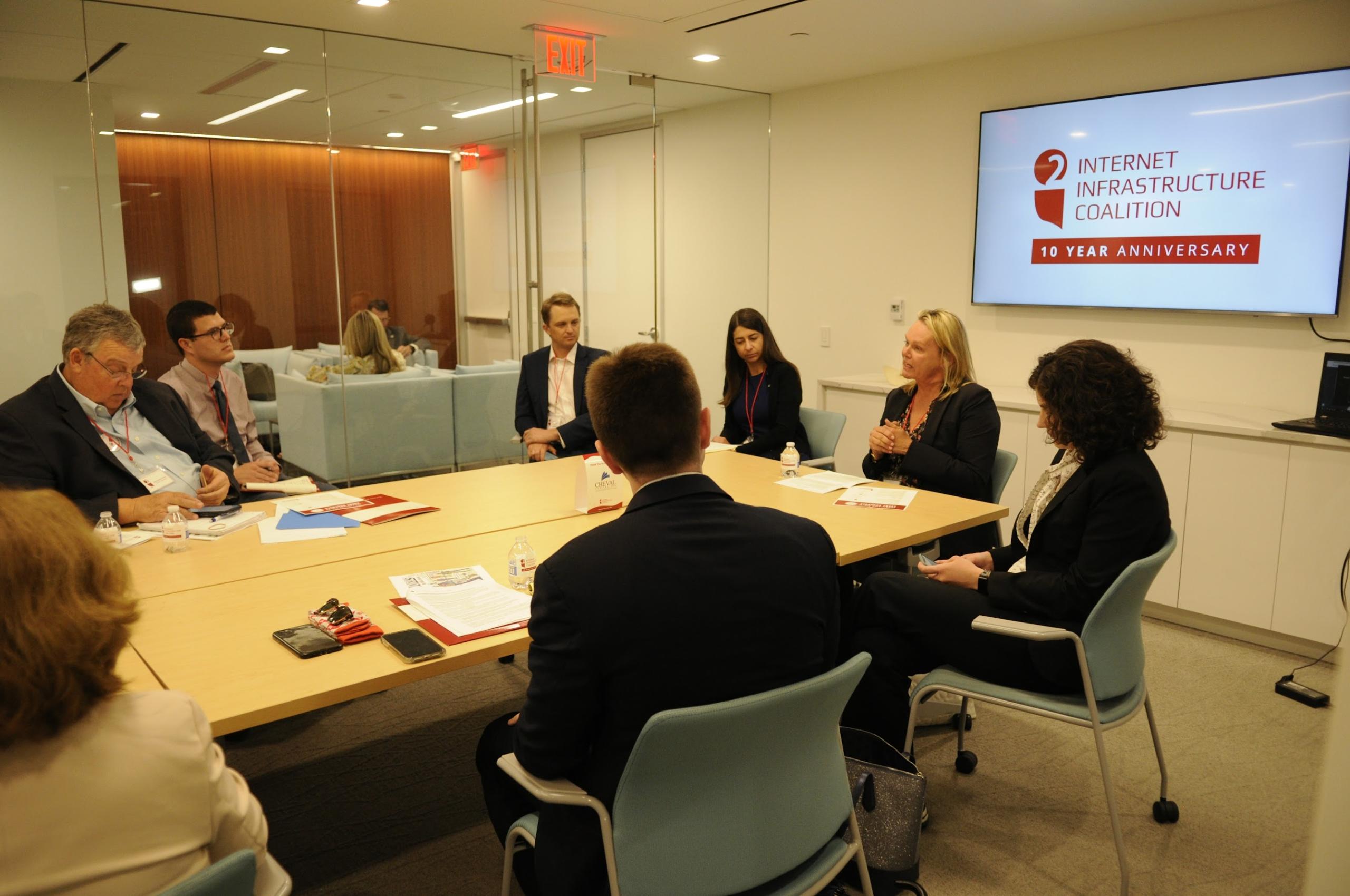
The first day’s sessions began with a great speech from Christian Dawson, Executive Director of the i2Coalition. We were being hosted for the day at TwinLogic Strategies, a Washington DC lobbying firm that does work on behalf of the i2Coalition. The day’s events were held in a lovely conference room (which was kept mercifully cool since most of us were in suits and business wear, many for the first time in a long time!).
The first session was called Lobbying 101 and was hosted by TwinLogic themselves. The speakers were Elizabeth Frazee and Veronica O’Connell, both experienced lobbyists in Washington DC’s political scene. Overall, their discussion was focused on how we could get the most out of the meetings in the coming days. But they also gave great advice on how to talk to politicians and the people who do most of the actual work for them (the staffers).
My biggest takeaway from this season was when Elizabeth said, “Once we get the election behind us, there’s still gonna be chaos as everyone tries to figure out which end is up. So my advice to everyone is just to try to keep politics out of it. Talk about the policy, talk about the way those policies impact your companies, and explain it in an understandable way for people they don’t understand.”
Policy, not politics.
That’s the first time I’ve heard politics put like that. I’d never really thought there was a distinction between the two. But she went on to say that politics in Washington DC is poisonous right now, but so that the wheels of lawmaking in DC can continue to work, everyone has to work together and get along in some way and keep things cordial. This would play out over the next couple of days of meetings when we would meet people from both parties. Everyone was perfectly nice and cordial. Everyone has a job to do. And they were perfectly willing to listen to our concerns. Whether or not they action anything based on these interactions is another matter entirely.
The focus of the first day was on members of the current Biden Administration (the second day would focus on Congressional staffers). First up was Alex Greenstein, who is the director of Privacy Shield at the US Department of Commerce. It was an interesting discussion on how the Administration is trying to guide upcoming privacy legislation and how it will affect transatlantic data flows with the EU and GDPR. As I am ‘new’ to these policy issues, I will admit there were a lot of acronyms and words I didn’t know about; I clearly have much to learn on this topic. DNS issues were a big topic of discussion as well, another topic I look forward to learning more about.
The next speaker was Darren Jones, an Assistant Director at the FBI. I didn’t know what to expect from this session. It was rather amusing; everyone in the room sat up a little straighter, knowing there were people from the FBI in the room (and a wave of concern that they arrived early…). We had no reason to be fearful, though; Mr Jones was a fascinating speaker. He’s had a long and interesting career at the FBI (which he told us all about).
As the ‘second tier’ of the internet, infrastructure providers have to regularly work with the FBI and other law enforcement operations; as usual, they are on the receiving ends of subpoenas and other legal requests. Being outside the USA, this is less important for someone like Blacknight. But as I’ve said before, the things the USA does affects all of the internet, whether it’s in the USA or not. He also joked that when people get a call from the FBI, they freeze up. So, their overall goal is to be friendlier and less threatening.
He gave some excellent insight into how the FBI operates. As an American, I found a lot of this fascinating because I simply had no idea. But he also focused on how the FBI used technology and how it works with technology companies in its law enforcement roles. One interesting bit was how the FBI collates and processes the thousands of inquiries it gets a day from local law enforcement agencies around the USA. Not to mention the tips they get every day – some credible, some ridiculous but all of them have to be vetted. Several things were said about massive data centres and operations in the mountains of West Virginia. We cannot even begin to comprehend the data processing power that just the FBI has at their disposal.
One of the most interesting takeaways was a bit esoteric and was brought up by a fellow member of the i2Coalition. The following only really applies to US companies. Infrastructure organisations get a lot of legal requests from law enforcement agencies. But there’s no formal process to actually verify these requests and make sure they’re genuine. The onus is on the provider to prove the request is ‘real’ – which usually means engaging lawyers to contact the law enforcement agency to verify the request. But what happens when you can’t get someone on the phone? It turns into a vicious loop of getting the request but not being able to check if it’s genuine. And plenty of people have filed fake requests with companies for this to be a problem. This blew my mind and the minds of my fellow attendees. Blacknight doesn’t really have to deal with this as Ireland only has one law enforcement agency to deal with and things can easily be verified. If you’re curious about your policy on working with law enforcement, you can read it here.
Next up were a couple of speakers from NTIA, which is The National Telecommunications and Information Administration (NTIA), an agency of the US Department of Commerce that serves as the President’s principal adviser on telecommunications policies. It’s the job of organisations like this to enforce the laws passed by Congress but also to lay out the Administration’s position on them as well. There was an interesting discussion about the Trusted Notifier program and also DNS abuse.
After that, we were done for the day, but first, there was a social event that gave us a chance to speak one-to-one with the various speakers and socialise. I will admit, it was a bit strange socialising after 2+ years of Zoom meetings!
Day 2 Sessions
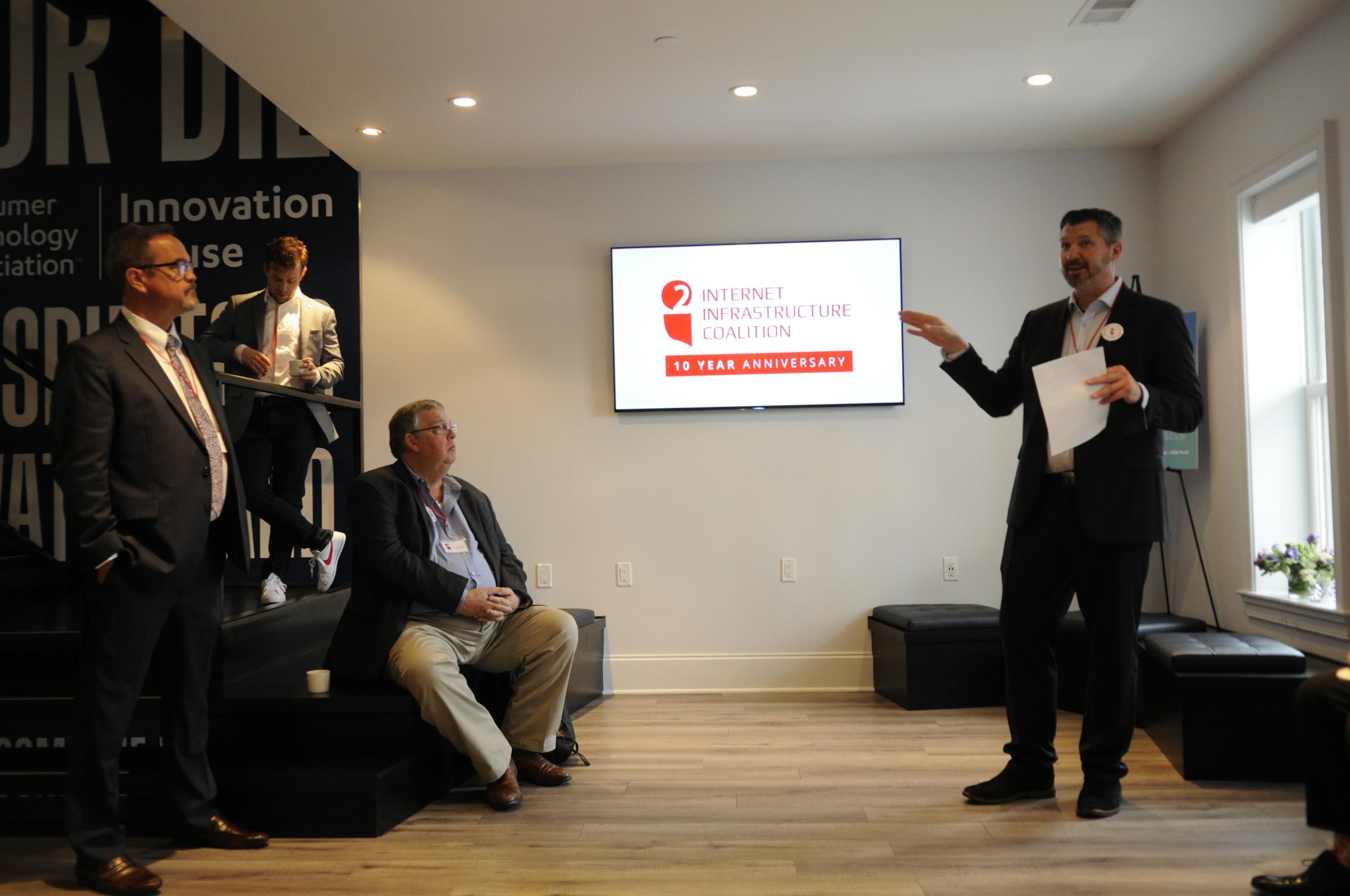
After a nice dinner and a good night’s sleep, it was time for day two, which would prove to be a much longer day. We had a 9 am start, but with the promise of breakfast (though I still had breakfast at the hotel anyway as I’m a Hobbit).
The day’s events were to be held at CTA Innovation House. The place is literally right across the street from the US Capitol building. It’s the home of the Consumer Technology Association, which is the trade lobbying organisation for all the gadgets that power our lives. They’re the same folks who run CES every year in Las Vegas. We had the place completely to ourselves that day, and it was a great place to have an event – it provided the flexibility we needed for the various events.
Because of COVID and the fact that much of the legislation we were discussing was being worked on that week, some of the speakers had to appear via Zoom instead of in person. But CTA Innovation house had the spaces and equipment to make all this work seamlessly.
There are quite a few speakers on the second day, so many, in fact, I’m not going to go through each one but instead summarise what I think are the key takeaways from the day overall. The focus of this day was speaking to people working in the House and Senate on the actual bills we wanted to influence. The staffers we spoke with are the ones actually writing these bills (I always thought the Congresspeople did the actual law writing, they do not).
Privacy Bill is not happening this year – While there will be movement on a US Federal privacy bill this year, it will not be passing this year simply because there are not enough ‘legislative days’ between now and the recess for the election in November. And then, whoever has control after the election may change strategies. There’s a small chance it passes uncontroversially during the ‘lame duck’ session between the election and when the new Congress is sworn in. If, as predicted, the Republicans win in November, people like Ted Cruz will now be in charge of this process.
Privacy Bill will be compatible with GDPR – This was a key point emphasised by several of the speakers. The legislators and those in the Biden Administration they’re working with are making a concerted effort to make whatever privacy bill gets passed compatible with the EU’s GDPR to maintain transatlantic data flows (a phrase used a lot). Blacknight’s stance is that we welcome any strengthening of privacy protections in the USA (even if they’ll never be as strong as they are in Europe). Either way, whatever is passed, will still probably be a headache for European and Irish companies.
Section 230 Reform – There’s been a lot of talk about reforming Section 230. This is a section from the Communications Decency Act that enshrined intermediary liability into the law. This means that platforms and infrastructure providers are not responsible for the content their customers and users put on their infrastructure. This little-known law, outside of wonky internet circles, helps keep the internet operating. But it’s now under attack, from the right-wing, who believe they’re being censored, to the left-wing, who believe it protects the big platforms from actual responsibility. Both want to reform Section 230 for different reasons.
Based on the conversations that our speakers had, it doesn’t look like there will be any movement on reform of Section 230 anytime soon. There’s just no bi-partisan consensus on what the reforms should be, and both parties are afraid of unpicking this thread of internet governance because it could unravel so much of what makes content work on the internet. That and the uncertainty around the upcoming election means that it’s safe for now. But if the US right-wing gains power in November, expect Section 230 to come under further fire (though how much will depend entirely on how they perceive they were wronged during the election cycle by social media).
WHOIS Reform – Access to WHOIS domain registration data was cut off when GDPR came into effect. This has been a huge privacy boon for individual users, who no longer have their contact information published freely on the internet. But it’s made a few parties angry that they can no longer easily access the data – law enforcement and the intellectual property industry. ICANN has been working on a solution to the problem. And this was discussed during our meetings. But it looks like it’s not something that will be addressed in any upcoming legislation. The i2Coalition is happy for the industry to handle this itself using the multi-stakeholder model (on the surface it seems like it’s taking a long time, but certain parties simply want the ‘old’ system back, and they can’t have it).
Updating DMCA – The Digital Millennium Copyright Act was a watershed piece of legislation that helped regulate the internet and battle content piracy. It’s also a law, for the most part, that works for infrastructure providers. There is talk, however, of reforming it and updating it for the 2020s, as a law that came into effect in 1998 isn’t exactly as relevant for the present-day internet when things change so fast. A law that was written before things like Facebook, YouTube, Google, TikTok, etc., even existed is being used to regulate them. What updates to the law will look like is not really clear right now, but it’s being discussed (and the i2Coalition will have a seat at the table).
After a whirlwind day of back-to-back speakers and a delicious catered lunch, by 4 pm, the day was nearing an end. We were all pretty exhausted from all the speakers, but it was certainly rewarding. Then it was time to party. After all, we were there to celebrate its 10th anniversary. There was another batch of speakers and then some awards. We got a lovely speech from Congressman Darrell Issa, who was critical in helping to shepherd the coalition into existence and has played a key role in internet legislation. They gave him an award.
You can watch the ceremony below:
There were a few other awards, including a surprise award from eco, Association of the Internet Industry – the i2Coalition’s European counterparts in honour of the milestone. The ‘fun’ guest speaker was comedian Julie Nolke, who went viral during the pandemic with her videos talking to her past self (which were hilarious!). She was really funny and gave a great speech. And then it was time for canapés and drinks to finish out the evening.
Overall, it was a fascinating and, dare I say, fun experience attending my first i2Colition fly-in. It was rather cool to be in the same room with some of the people who essentially run the internet – from the infrastructure to the policy that makes it all work in chaotic harmony. I look forward to future events!

